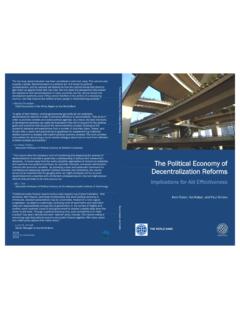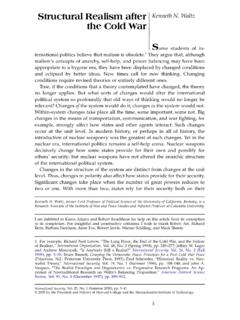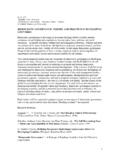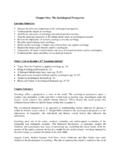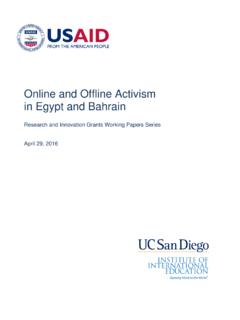Transcription of Public Services Delivery - ISBN: 0821361406
1 Public SERVICESDELIVERYE dited by ANWAR SHAHPUBLIC SECTORGOVERNANCE AND ACCOUNTABILITY SERIESPUBLICSERVICES Delivery Introduction to the Public Sector Governance and Accountability Series Anwar Shah, Series Editor A well-functioning Public sector that delivers quality Public Services consistent with citizenpreferences and that fosters private market-led growth while managing fiscal resources pru-dently is considered critical to the World Bank s mission of poverty alleviation and theachievement of Millennium Development Goals. This important new series aims to advancethose objectives by disseminating conceptual guidance and lessons from practices and byfacilitating learning from each others experiences on ideas and practices that promoteresponsive(by matching Public Services with citizens preferences),responsible(through effi-ciency and equity in service provision without undue fiscal and social risk), and accountable(to citizens for all actions) Public governance in developing series represents a response to several independent evaluations in recent years thathave argued that development practitioners and policy makers dealing with Public sectorreforms in developing countries and, indeed, anyone with a concern for effective Public gov-ernance could benefit from a synthesis of newer perspectives on Public sector reforms.
2 Thisseries distills current wisdom and presents tools of analysis for improving the efficiency,equity, and efficacy of the Public sector. Leading Public policy experts and practitioners havecontributed to the first seven volumes in the series (Fiscal Management, Public Services Delivery ,Pub-lic Expenditure Analysis,Tools for Public Sector Evaluations,Macrofederalism andLocalFinances,International Practices in Local Governance,and Citizen-Centered Governance) areconcerned with Public sector accountability for prudent fiscal management; efficiency andequity in Public service provision; safeguards for the protection of the poor, women, minori-ties, and other disadvantaged groups; ways of strengthening institutional arrangements forvoice and exit; methods of evaluating Public sector programs, fiscal federalism, and localfinances; international practices in local governance; and a framework for responsive andaccountable Management Edited by Anwar ShahPublic Expenditure AnalysisEdited by Anwar ShahTools for Public Sector EvaluationsEdited by Anwar ShahMacrofederalism and Local FinancesEdited by Anwar ShahInternational Practices in Local GovernanceEdited by Anwar ShahCitizen-Centered GovernanceMatthew Andrews and Anwar ShahTHE WORLD BANKW ashington, Delivery Edited by ANWAR SHAHPUBLIC SECTOR GOVERNANCE ANDACCOUNTABILITY SERIES 2005 The International Bank for Reconstruction and Development / The World Bank1818 H Street NWWashington DC 20433 Telephone: 202-473-1000 Internet: : rights reserved123408070605 The findings, interpretations, and conclusions expressed herein are those of theauthor(s) and do not necessarily reflect the views of the Executive Directors ofthe International Bank for Reconstruction and Development / The World Bankor the governments they World Bank does not guarantee the accuracy of the data included in thiswork.
3 The boundaries, colors, denominations, and other information shown on anymap in this work do not imply any judgement on the part of The World Bank con-cerning the legal status of any territory or the endorsement or acceptance of and PermissionsThe material in this publication is copyrighted. Copying and/or transmitting por-tions or all of this work without permission may be a violation of applicable law. TheInternational Bank for Reconstruction and Development / The World Bank encour-ages dissemination of its work and will normally grant permission to reproduce por-tions of the work permission to photocopy or reprint any part of this work, please send a request with complete information to the Copyright Clearance Center Inc.,222 Rosewood Drive, Danvers, MA 01923, USA; telephone: 978-750-8400; fax: 978-750-4470; Internet: other queries on rights and licenses, including subsidiary rights, should beaddressed to the Office of the Publisher, The World Bank, 1818 H Street NW, Wash-ington, DC 20433, USA; fax: 202-522-2422; e-mail: 978-0-8213-6140-5 isbn -10: 0-8213-6140-6eISBN: 0-8213-6141-4 DOI: of Congress Cataloging-in-Publication DataPublic Services Delivery / edited by Anwar cm.
4 ( Public sector governance, and accountability series)Includes bibliographical references and 0-8213-6140-6 (pbk.)1. Government productivity Evaluation. 2. Public administration Evaluation. Services Evaluation. 4. Medical care Evaluation. 5. Education Evaluation. welfare Evaluation. 7. Infrastructure (Economics) Evaluation. I. Shah, World Bank. III. '068'4 dc222005043246vContentsIntroduction to the Public Sector Governanceand Accountability SeriesiiForewordixPrefacexiAcknowledgmen tsxiiiContributorsxvAbbreviations and AcronymsxxiOverviewxxiiiby Anwar ShahIssues Associated with theImplementation of Governmentwide Perfor-mance Monitoring1by Alasdair RobertsCurrent Efforts at Governmentwide Performance Monitoring 4 Difficulties in Execution11 Prospects for Governmentwide Performance Planning23 Annex : Outcome Measures in the Oregon Plan30 Annex : Outcome Measures in the Florida Plan311 CHAPTERA nnex : Outcome Measures in the Alberta Plan34 Annex : Outcome Measures in the Nova Scotia Plan35 Annex : Draft Outcome Measures for the Canadian Government37A Simple Measure of Good Governance39by Jeff Huther and Anwar ShahMeasuring Governance Quality40 Impact of Fiscal Decentralization on Governance Quality46 Quality of Governance and Decentralization 52 Conclusion54 Annex.
5 Sources and Quality of Data and Explanations Regard-ing Development of Component Indexes 57 Annex : Composite Indexes60 Assessing Local Government Performance in Develop-ing Countries63by Matthew Andrews and Anwar ShahEvaluation Criteria64 Evaluating Conformance to Legislation and Process65 Evaluating Responsiveness72 Evaluating Efficiency75 Evaluating Accountability77 Conclusion80 Results Matter: Suggestions for a Developing Country sEarly Outcome Measurement Effort85by Harry P. HatryWhat Is Outcome Measurement?85 Why Measure Outcomes?86 Obstacles to Outcome Measurement in Developing Countries86 Basic Steps in Implementing an Outcome Measurement Process88 Basic Outcome Measurement Procedures and Their Costs93viContents234 Measurements of Extent of Corruption98 Measurements of Response Time99 Data Quality Control100 Using Outcome Data100 Final Note102 Annex : Household Questionnaire103 Annex : Trained Observer Procedures107 Annex : Examples of Performance Indicators for TrackingAnticorruption EffortsDelivering Local/Municipal Services117by Harry KitchenPublic Sector Alternatives117 Private Sector Provision128 Public -Private Partnerships139 Summary145 Assessing the Performance of Health Services in Reaching the Poor153by Agnes Soucat, Ruth Levine, Adam Wagstaff, Abdo S.
6 Yazbeck,Charles C. Griffin, Timothy Johnston, Paul Hutchinson, and Rudolf KnippenbergChanneling Resources to the Poor156 Reaching the Poor: Equity of Coverage for Interventions Address-ing the Needs of the Poor162 Equity and the Impact of Health Sector Financing178 Conclusion185 Measuring Public Sector Performance in Infrastructure193by Hadi Salehi EsfahaniThe Nature of the Problem195 Choosing Performance Indicators196 Evaluating Trained Observer Rating PRSP Framework Determinants of Health DALYs Lost per 1,000 Population by Eight Steps to Effective Coverage for the Poor Components of Governance Ranking of Countries on Governance Governance Index Correlation Correlation of Subnational Expenditures with Governance Quality Omissions from Original Outcome Indicators for Elementary and Secondary School Outcome Indicators for Youth Outcome Indicators for Solid Waste Toronto Road Condition Rating Private versus Public Sector Delivery in Sources of Data for Assessing Example of Determinants of Coverage with a Core Package of Summary of Major Questions to Be Answered in a Health Financing Examples of Performance Measures for Power Examples of Performance Measures for Telecommunications Examples of Performance Measures for Transportation Examples of Performance Measures for Water Examples of Performance Measures for Sanitation Infrastructure202viiiContents111110ixFor ewordIn Western democracies
7 Systems of checks and balances built intogovernment structures have formed the core of good governanceand have helped empower citizens for more than two hundred incentives that motivate Public servants and policy makers the rewards and sanctions linked to results that help shape publicsector performance are rooted in a country s accountabilityframeworks. Sound Public sector management and governmentspending help determine the course of economic development andsocial equity, especially for the poor and other disadvantagedgroups such as women and the developing countries, however, continue to suffer fromunsatisfactory and often dysfunctional governance systems includ-ing rent seeking and malfeasance, inappropriate allocation ofresources, inefficient revenue systems, and weak Delivery of vitalpublic Services . Such poor governance leads to unwelcome out-comes for access to Public Services by the poor and other disadvan-taged members of the society such as women, children, andminorities.
8 In dealing with these concerns, the development assis-tance community in general, and the World Bank in particular, arecontinuously striving to learn lessons from practices around theworld to achieve a better understanding of what works and whatdoes not work in improving Public sector governance especiallywith respect to combating corruption and making Services work forpoor series advances our knowledge by providing tools and lessonsfrom practices for improving the efficiency and equity of publicservices provision and for strengthening institutions of accountability ingovernance. The series highlights frameworks for creating incentive envi-ronments and pressures for good governance from within and beyond gov-ernments. It outlines institutional mechanisms for empowering citizens todemand accountability for results from their governments. It provides prac-tical guidance on managing for results and on prudent fiscal outlines approaches to dealing with corruption and malfeasance.
9 It pro-vides conceptual and practical guidance on alternative service deliveryframeworks for extending the reach and access of Public Services . The seriesalso covers safeguards for the protection of the poor, women, minorities andother disadvantaged groups; strengthening institutional arrangements forvoice and exit; methods of evaluating Public sector programs; frameworksfor responsive and accountable governance; and fiscal federalism and Public Governance and Accountability Serieswill be of interest to publicofficials, development practitioners, students of development, and thoseinterested in Public governance in developing A. L autierVice PresidentWorld Bank InstitutexForewordxiPrefaceGlobalization , localization, and information revolution areempowering citizens to demand accountability from their govern-ments. For such accountability to be an effective tool, a frameworkfor measuring government performance for Public Services deliv-ery is required. This book provides tools of analysis for measuringperformance for the whole of government and for various levels ofgovernment, as well as for important individual sectors such ashealth, infrastructure, and local and municipal Services .
10 The bookalso draws lessons from performance measurement systems inindustrial underlying framework presented in this book addresses twooverarching issues: (a) whether the Public manager is doing the rightthings that is, delivering Services consistent with citizen prefer-ences; and (b) whether they are doing it right providing servicesof a given quality at the lowest tax cost to citizens. To answer thesequestions, the book operationalizes the following empirical tests: Efficacy test:What is the extent to which the Public programsmeet stated goals? Efficiency test:Are Public Services being delivered in a least costmanner for a given quantity and quality of Services ? Alternate service Delivery test:Is the access to Public Services beingexpanded with appropriate partnership or contractual relation-ships within and beyond government? What activities or pro-grams could be outsourced in whole or in part to the private orvoluntary sectors? Money s worth test:Are the Public funds being put to their best use?




